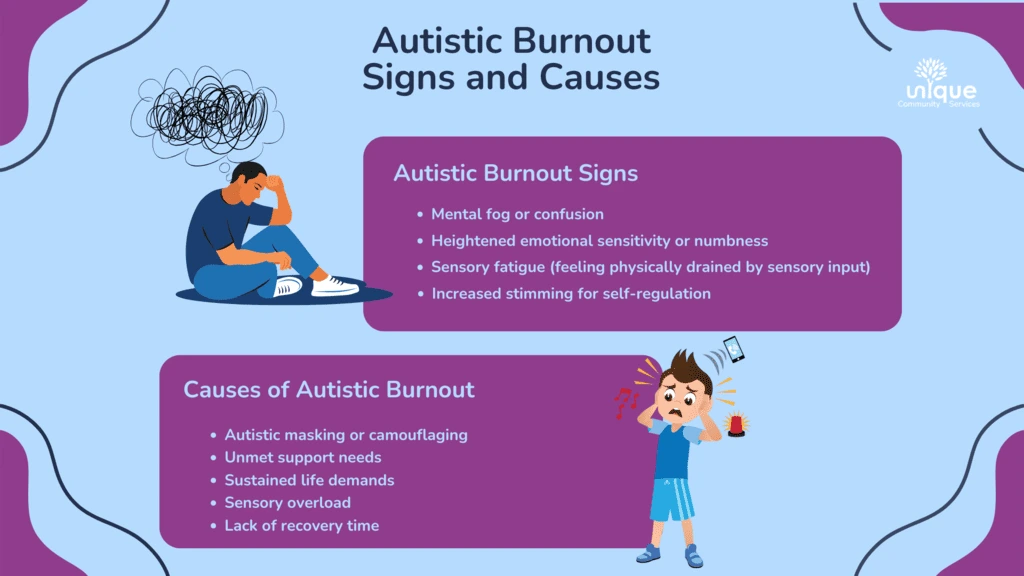What is Autistic Burnout?
Autistic burnout is a state of intense physical and mental fatigue that many autistic people experience after prolonged, heightened stress or demands that exceed their ability to cope. The intense physical and mental exhaustion related to autistic burnout can affect the person’s mental health and executive functioning skills, especially in environments where they are masking their autistic traits or not receiving he right support, commonly known as autistic masking.
Shared lived experiences from the autistic community show that the stress of adapting to a world built for neurotypical people can lead to burnout. People experiencing autistic burnout may struggle with sensory overload, chronic fatigue, and even substance abuse or self-harm.

While anyone can experience burnout, autistic burnout is deeper and longer-lasting, often involving a loss of previously developed abilities and a need for extended recovery. It also stems from a mismatch between the autistic person’s needs and their environment, especially when those needs are misunderstood or invalidated. When they last over a more extended period of time, intense exhaustion and reduced tolerance to sensory stimuli might arise, which directly impacts the person’s social interactions, education, and employment.
Autistic Burnout Signs and Symptoms
Autistic burnout impacts a person’s emotional, cognitive, behavioural and physical functions, and can interfere with the person’s ability to manage everyday activities. Researchers have begun to realise that people describing burnout are referring to a common set of symptoms that are distinct from depression and occupational burnout.
What is important to understand is that these symptoms or characteristics of autistic burnout are not a sign of failure or regression, but a natural response to masking, prolonged stress, and unmet needs.
Below are common signs and symptoms of autistic burnout:
Cognitive Symptoms
Autistic burnout disrupts how the brain processes and organises information. People may feel mentally foggy, slower in thinking, or less able to carry out everyday tasks that usually come easily.
- Mental fog or confusion
- Trouble concentrating or focusing
- Difficulty with speech or finding words
- Forgetfulness and poor short-term memory
- Struggles with planning, organising, or initiating tasks
Emotional Symptoms
Emotionally, burnout can feel like an overwhelming weight. Autistic people may experience intense or fluctuating feelings, become emotionally withdrawn, or feel unable to connect with others or themselves.
- Increased anxiety or panic
- Low mood or depressive feelings
- Heightened emotional sensitivity or numbness
- Feeling overwhelmed or emotionally drained
- Irritability, frustration, or hopelessness
Physical Symptoms
The body can also feel the toll of burnout. Many autistic people describe feeling completely drained, struggling with sleep, or dealing with stress-related physical issues that interfere with daily life.
- Persistent exhaustion (even after rest)
- Sleep disruption (insomnia or oversleeping)
- Headaches, muscle aches, or stomach problems
- Sensory fatigue (feeling physically drained by sensory input)
- Immune system issues (getting sick more often)
Social and Functional Symptoms
Burnout can profoundly affect daily functioning and social engagement. Tasks that once felt manageable may become impossible, and socialising may feel too overwhelming or demanding to attempt.
- Withdrawal from social interaction
- Decreased interest in relationships or hobbies
- Reduced ability to cope with everyday tasks
- Avoidance of responsibilities or communication
- More frequent shutdowns or emotional meltdowns
Behavioural Symptoms
Changes in behaviour are often the most visible signs of autistic burnout. These may include increased stimming, avoidance, shutdowns, or reversing earlier coping strategies as the nervous system seeks stability.
- Increased stimming (e.g., rocking, fidgeting, humming) for self-regulation
- Task refusal or avoidance of even simple daily demands
- Rigid routines or rituals becoming more intense
- Disengagement (e.g., lying in bed for long periods, avoiding contact)
- Repetitive behaviours increasing in frequency or intensity
- Shutdowns (becoming nonverbal, withdrawing from interaction)
- Meltdowns triggered more easily and lasting longer
- Regression in daily living skills (e.g., hygiene, eating, communicating)
Causes of Autistic Burnout
The causes of autistic burnout are usually a combination of long-term stress, sensory overwhelm, social pressure, and a lack of appropriate support, which impact people’s mental health. It’s not caused by a single event but by chronic overload that outpaces an autistic person’s ability to recover or self-regulate.
Here’s a breakdown of the leading causes:
Autistic Masking or Camouflaging
It means consistently hiding or suppressing autistic traits to appear ”neurotypical” in autistic children and autistic individuals.
- Forcing eye contact, using scripted speech, or mimicking social behaviours
- Hiding stimming or sensory needs
- Suppressing natural reactions to discomfort.
Over time, masking leads to extreme mental and emotional fatigue.
Unmet Support Needs
Under unmet support needs, it means lacking personalised support or creating noisy environments and accommodations in the home, work, or school.
- No sensory-friendly environments or quiet spaces
- Tasks or expectations not adapted to the communication or processing style
- Ignored or dismissed requests for help
Invest in building sensory rooms and environments that promote calmness and peaceful time.
Sustained Life Demands
Chronic exposure to high-pressure situations without adequate recovery time, such as:
- Juggling responsibilities without downtime
- Managing routines, decision-making, transitions, or changes in the environment
- Overcommitment to tasks, jobs, or social obligations
In time, sustained life demands turn to internal resources and reduce the ability to cope.
Sensory Overload
The exposure to environments that overstimulate the senses is always a significant cause of autistic burnout. It can include:
- Bright lights, strong smells, loud noises, or crowded places
- Inability to control or escape sensory input
The unique challenges of sensory overload can easily result in exhaustion, shutdowns, and emotional distress.
Lack of Recovery Time
Another major cause is not having enough time for rest, regulation, or sensory decompression, including:
- Back-to-back activities without breaks
- No quiet time to process emotions or events
- Living in a fast-paced or unpredictable environment
It leaves no space to recharge, leading to cumulative stress.

How do Autistic People Recover from Burnout?
Recovery from autistic burnout is a gradual process that requires compassion, patience, and a supportive environment. Unlike neurotypical people who may bounce back from stress with a short rest or break, autistic people need deeper, longer-term adjustments that honour their unique autistic experience.
- Reduce Executive Function Demands
Even simple daily tasks like brushing teeth, preparing food, or answering messages can feel overwhelming during burnout. These are executive function demands, and they often become too much to manage.
Recovery begins by removing or simplifying these demands, such as:
- Using visual schedules or reminders
- Breaking tasks into small, manageable steps
- Asking for help with decision-making or daily planning
- Prioritise Emotional Regulation
Autistic burnout often affects a person’s emotional regulation, making it harder to manage stress, frustration, extreme fatigue or overstimulation.
Helpful strategies to regulate sensory sensitivity include:
- Quiet time in sensory-safe environments
- Stimming or self-soothing behaviours (e.g., rocking, humming)
- Emotional expression through writing, art, or trusted support
- Access to therapy that respects the autistic perspective
- Spot and Respond to Early Signs
Recognising the early signs of burnout helps prevent more profound exhaustion. These may include increased tiredness, irritability, loss of skills, or a desire to withdraw.
Supporting recovery means:
- Respecting those early signals, not pushing through them
- Encouraging rest before crisis points
- Allowing autonomy in how rest and recovery happen
- Step Away from the Usual Routine
A rigid or demanding usual routine can contribute to burnout. While routines are often helpful to autistic people, during burnout, they may need to be adapted or paused.
Recovery may involve:
- Time off from school, work, or social commitments
- More flexible or low-demand days
- Creating a safe routine focused on rest, interests, and gentle activities
- Honour the Autistic Experience
Autistic burnout recovery requires acknowledging that autistic individuals experience the world differently from neurotypical people.
That includes:
- Creating environments where masking isn’t expected
- Validating sensory needs, communication styles, and social preferences
- Avoiding pressure to “get back to normal” too quickly—recovery happens in stages
- Focus on Mental Health, Not Just Function
Support for mental health is just as important as restoring function. Autistic burnout often involves anxiety, low mood, or emotional exhaustion.
Helpful supports to improve one’s well-being include:
- Access to therapists who understand and specialise in autism support
- Peer support from other autistic people
- Time for rest, self-care and healing
Read more about how to help an autistic person recover from autistic burnout.
How to Prevent Autistic Burnout?
Preventing autistic burnout involves creating a life rhythm and environment that respects the needs, limits, and preferences of autistic people. Since autistic burnout is typically caused by chronic overwhelm, masking, sensory overload, and lack of support, prevention focuses on reducing demands, increasing understanding, and honouring neurodiversity.
The majority of autistic adults face immense pressure to prove their qualities and excel in a society that tends to overlook their specific needs. Here we share some prevention principles that autistic people can use:
✔ Reduce demands
✔ Validate the autistic experience
✔ Respect sensory and emotional needs
✔ Allow for authentic expression
✔ Prioritise recovery time
✔ Act early when signs appear

How to Support Someone Who Is Experiencing Autistic Burnout?
Providing a calm, familiar, and sensory–friendly space helps reduce distress, while validating the person’s experience without trying to fix or rush their recovery creates psychological safety. Nourishment, hydration, reduced executive functioning demands, and the freedom to unmask (such as being nonverbal, stimming, or disengaging from conversation) should all be encouraged. Small acts such as offering a favourite food, removing noise, or simply allowing silence can significantly impact.
Longer-term support involves rebuilding at the person’s pace, supporting emotional regulation through self-soothing tools or therapy from neurodiversity-affirming professionals, and gradually reintroducing structure only when the person is ready. Family, carers, and workplaces always play a key role by advocating for adjustments like flexible deadlines, time off, reduced sensory input, and the option to communicate in preferred ways. Ultimately, recovery is not about returning to “normal” but about creating a more sustainable, respectful way of living that honours autistic needs. Autistic burnout is real, and support must be rooted in safety, trust, and the freedom just to be.
Autism Support With Unique Community Services
At the heart of Unique Community Services‘ work is a commitment to providing compassionate, nurse-led, therapy-informed care tailored to each person’s journey. With a dedicated support team by their side, people can overcome challenges and regain their executive functioning skills.
Our team delivers person-centred care services for autistic people in their own homes, allowing them to stay close to their loved ones. We work closely with specialists and family members to assess every person’s health and individual preferences. Also, we outline a personalised care plan that prioritises the person’s privacy, dignity, and personal boundaries.
Our services include:
- Long-term support and urgent care delivered in the comfort and familiarity of people’s own homes
- Personalised care plans co-created with the individual, reflecting their needs, goals, and preferences
- Round-the-clock nurse-led care, with rapid response available within 2 to 4 hours
- Transitional care pathways designed to support smooth, safe moves from hospital to home or supported living
- A skilled in-house therapy team offering proactive support, grounded in strength-based and trauma-informed frameworks such as PROACT-SCIPr-UK®, PACE, PERMA, and Talking Mats
William’s Care Journey with UCS:
Our trained home care workers deliver CQC-regulated support to autistic people across the UK, with offices in Leeds and Manchester.
Contact us now, and we will create a tailored care plan according to your specific requirements.
